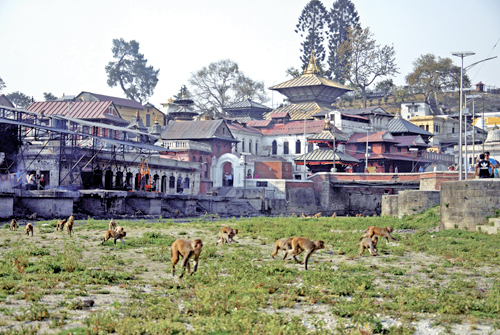PADT to hold study on monkeys
Kathmandu, April 9
The Pashupati Area Development Trust is planning to conduct a behavioural study of monkeys in the Pashupati area to see whether the animals are causing any harm to pilgrims.
After an interim order from the Supreme Court, which suggested the board to act on the havoc caused by monkeys, the trust is preparing to conduct a study to find out more on the monkeys of Pashupatinath area.
According to PADT office, which is yet to receive an official written order from the Supreme Court, the PADT felt the study was necessary.
“Although we have not received any complaint, there are some anti-Hindu elements who are trying to destroy harmony by blaming monkeys baselessly,” Govinda Tandon, member secretary of PADT, told The Himalayan Times. “ To expose the reality, PADT felt the necessity for a behavioural study on monkeys of Pashupatinath area.” Tandon said the study would begin at the earliest.
According to PADT, the truth is the opposite of the claims made against monkeys. “On Thursday, during a shraddha (a ceremony for the dead), a monkey just came near the ceremony spot and all of sudden some people killed the monkey by hitting him on the head with a rod,” explained Tandon, adding “People blame monkeys, but in reality, monkeys are the real victims here.”
He said the claims that those monkeys in Pashupainath carried diseases were false and no health report could prove it.
Meanwhile, Kathmandu District Forest Office said if monkeys were actually troubling pilgrims, pest extermination would be the best solution.
District Forest Officer of Kathmandu, Indra Sapkota, said, “The DFO has sent a draft of a pest extermination proposal to the Ministry of Forest and Soil Conservation to combat the issue,” Sapkota said.
Wildlife expert and visiting professor of Kyoto University, Japan, Dr Mukesh Kumar Chalise, has appealed to authorities to first conduct a research on the monkeys and their activities before taking any drastic decision.
Chalise’s study has shown that at least 900 of 1,627 simians recorded in the Kathmandu Valley are infected with zoonotic diseases.






